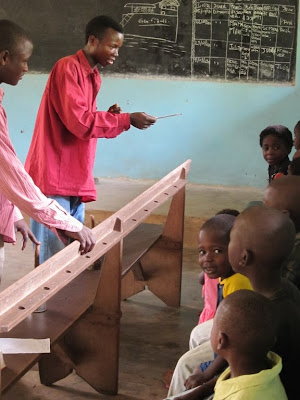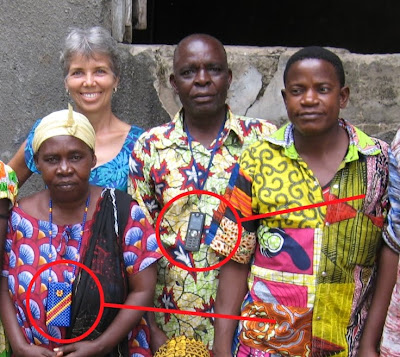 ACDI Lusekele extension specialists, Philippe Kikobo and Philomene Bidimbu, explain the details of cassava mosaic virus to the principal of the CBCO high school at Kumbi. The agricultural section of the high school is trying out four disease-resistant varieties.
ACDI Lusekele extension specialists, Philippe Kikobo and Philomene Bidimbu, explain the details of cassava mosaic virus to the principal of the CBCO high school at Kumbi. The agricultural section of the high school is trying out four disease-resistant varieties. Philippe and Georges Mulwa talk with the wife of the Kumbi village chief. Her field was dotted with manioc plants riddled with mosaic disease.
Philippe and Georges Mulwa talk with the wife of the Kumbi village chief. Her field was dotted with manioc plants riddled with mosaic disease.In your world, where is God right now? Does He care about the things that press on you this morning? Is He interested in how you are going to pay for groceries or replace the broken printer or repair that car that you depend on to get to work? Is he interested in the son you lost recently after a short lifetime of struggle, in the grief and guilt that washes over you? Does He have a stake in the big project you are working on? Does He give a whit about the disagreements in your local fellowship that sow suspicion and hurt? Can He heal the discouraged spirits? Does He want to?
As Christians who try the best we can to walk in the steps of Jesus, we believe that Infinite God, Creator of the Universe, loves each one of us like an only daughter or only son. Reading “God loved the world so much . . .”, our hearts change the infinite into the intimate, yielding “God loved insignificant me so much, that he gave his only Son . . .” We believe that God knows, that God cares and that God acts to nourish and to save each one us.
If anything, people in Congo take questions about how the unseen, spiritual world relates to the material world more seriously that most of us Americans. For most people here, the relationships and interplay of powers in the spiritual world determine our health, well-being and success (or failure) in taking advantage of opportunities we encounter. Many assume that God is far away, at best disinterested, at worst capricious and malevolent, leaving human beings in a complicated and dangerous maelstrom of competing spiritual powers.
One question that pushes Christian believers everywhere is how can we help people to see God who reveals Himself as loving Father? How is God present in the day to day lives of rural Congolese? Since our work at Lusekele focuses on agricultural innovations and the lives of people here revolve around agriculture, perhaps it is only natural to see God’s activity in agricultural clothing. Where poverty grinds away at people’s hopes and serious plant disease gnaws at distressingly meager agricultural surpluses, God has brought to everyone’s attention manioc varieties that are disease-resistant and high-yielding. We believe that our loving Father has seen our neighbors in need and holds out this promise to them – a promise that could easily double their income and erase almost completely the incidence of malnutrition.
 Philippe demonstrates how to create a small bench terrace around a newly planted oil palm.
Philippe demonstrates how to create a small bench terrace around a newly planted oil palm.Philippe Kikobo spends 15 days each month riding a dirt bike over tough eroded roads, visiting farmers in isolated villages and sharing good news about what God is doing right now. After a hard day walking to distant fields or once again picking the motorcycle up after a fall, the only bed is a woven mat over a crude stick bed-frame. Meals are often spare and bathing water scarce. Last week Miriam and I had a chance to go along for the ride. It gave us a new appreciation for the physical challenges ACDI’s extension specialists face month after month after month. During October, Philippe worked with 33 different farmer’s groups.
His job is to create a culturally safe environment in which skeptical farmers can test out these new manioc, peanut or oil palm varieties that God has made and compare them with the best traditional varieties. The message is, “See for yourself what God has done. See what a difference it can make in your family, in your village, in your church.” For many people the results are a revelation. They never dreamed that an ordinary field could produce so much more. And every cooperating group is left with a bit more evidence that God is near, conscious of their daily needs, actively making provision for them.
 Philippe and a cooperating farmer share a joke after visiting a peanut demonstration field near Kikwanga 1.
Philippe and a cooperating farmer share a joke after visiting a peanut demonstration field near Kikwanga 1.Brennan Manning in The Ragamuffin Gospel tells the story of a woman who attended a retreat he organized. She longed for a concrete certainty that God had touched her with His closeness and love. Unfortunately there is no formula for achieving this grace; if there was it wouldn’t be grace. Together they simply asked the Lord for his loving presence. The following day, the woman took a walk on the beach near the retreat house. Some distance up the beach a teen-aged boy and a woman were walking toward her. As they drew closer, the woman broke away and approached Brennan Manning’s friend. Without hesitation she embraced her, kissed her on the cheek, said “I love you” and continued her walk down the beach. That totally unexpected action by a total stranger mediated the message of God’s love in a powerful new way to this seeking woman.
A successful demonstration field of a highly-productive cassava variety is just as ambiguous (or potentially just as clear) as a random act of tenderness by a stranger on a lonely beach. To the eyes of people yearning to know who God really is and where He is right now, it might just be the sign that reveals how deep is the love of God and how close He is. Philippe and the 4 other ACDI extension specialists can’t manufacture the experience for people. But like all Christians, we can try to create a place where people glimpse divine love and grace and might go on to truly encounter God, who is infinite and intimate at the same time.
 The last visit of the day - beside the manioc multiplication field these two women had a small plot of traditional Bambarra groundnuts.
The last visit of the day - beside the manioc multiplication field these two women had a small plot of traditional Bambarra groundnuts.

































